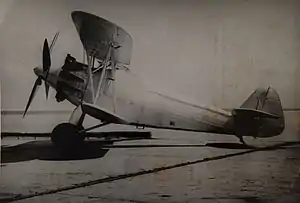Arado Ar 64
The Arado Ar 64 was a single-seat biplane fighter, developed in the late 1920s. It was among the first fighters produced when Germany abandoned the restrictions of the Treaty of Versailles and began rearming.[1]
| Ar 64 | |
|---|---|
 | |
| Role | Biplane fighter |
| Manufacturer | Arado |
| First flight | Spring 1930[1] |
| Primary user | Luftwaffe |
| Number built | 24[1] |
Design and development
The Ar 64 was a derivative of the earlier Arado SD II and Arado SD III, based upon the Reichswehrministerium's (Reich War Ministry) requirement for a successor to the Fokker D.XIII fighter. The AR 64D and 64E would the first fighters built in quantity by Germany since the end of World War I. The two differed, as the 64D had a revised undercarriage and a four-blade propeller, and the 64E had a two-blade propeller attached to a direct-drive version of the Jupiter VI radial engine. In the summer of 1932, 20 aircraft of both types were ordered and 19 of them were assigned to the Jagdfliegerschule at Schleissheim and the Jagdstaffeln of the Fliegergruppe Doberitz and Fliegergruppe Damm.[1]
Variants
Data from: [1]
- Ar 64a
- Prototype, powered by a 395 kW (530 hp) Bristol Jupiter VI nine-cylinder radial. First flight in 1930. One built
- Ar 64b
- Only two built, powered by a 477 kW (640 hp) BMW VI 6.3 12-cylinder V-type water-cooled engine. First flight in 1931. Two built.
- Ar 64c
- Powered by a 395 kW (530 hp) Jupiter VI radial, but with minor structural changes. One built.
- Ar 64D
- Production model. Featured redesigned, and enlarged vertical tail surfaces and a revised undercarriage. Powered by a geared Jupiter VI radial. A total of 20 D and E model Ar 64s were built.
- Ar 64E
- Production model. Similar to the 64d but with a direct-drive version of the Jupiter VI radial. A total of 20 D and E model Ar 64s were built.
Specifications (Ar 64D)
Data from Aircraft of the Third Reich[1]
General characteristics
- Crew: one
- Length: 8.43 m (27 ft 8 in)
- Wingspan: 9.9 m (32 ft 6 in)
- Empty weight: 1,210 kg (2,668 lb)
- Max takeoff weight: 1,680 kg (3,704 lb)
- Powerplant: 1 × Siemens (Bristol) Jupiter VI 9-cyl. air-cooled radial piston engine, 395 kW (530 hp)
- Propellers: 4-bladed wooden fixed pitch propeller
Performance
- Maximum speed: 250 km/h (160 mph, 130 kn) at 5,000 m (16,404 ft)
Armament
- 2 × 7.92 mm (0.312 in) MG 17 machine guns
Notes
- Green, William (2010). Aircraft of the Third Reich (1st ed.). London: Aerospace Publishing Limited. p. 23. ISBN 978 1 900732 06 2.
References
| Wikimedia Commons has media related to Arado Ar 64. |
- Green, William, and Gordon Swanborough, The Complete Book of Fighters (Salamander Books, 2002)
- Green, William (2010). Aircraft of the Third Reich (1st ed.). London: Aerospace Publishing Limited. p. 23. ISBN 978 1 900732 06 2.
